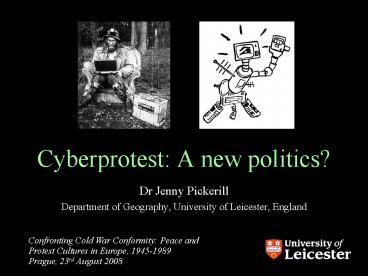Cyberprotest: A new politics - PowerPoint PPT Presentation
1 / 16
Title:
Cyberprotest: A new politics
Description:
'PIMP is basically like an answering machine for Indymedia. You dial the PIMP number, then go through the voice menu, selecting the ... – PowerPoint PPT presentation
Number of Views:26
Avg rating:3.0/5.0
Title: Cyberprotest: A new politics
1
Cyberprotest A new politics?
- Dr Jenny Pickerill
- Department of Geography, University of Leicester,
England
Confronting Cold War Conformity Peace and
Protest Cultures in Europe, 1945-1989 Prague,
23rd August 2008
2
(No Transcript)
3
Structure of talk
- Introduction
- Shaping politics via ICTs
- Implications for politics
- The challenge of new technologies
- Conclusions
4
Introduction
the global Internet is creating the base and
the basis for an unparalleled worldwide anti-war/
pro-peace and social justice movement during a
time of terrorism, war, and intense political
struggle (Kahn and Kellner, 2004, p.88)
for all their commitment to radical change, the
presence of activists on the Net is part of the
process of political normalisation they
represent a familiar element of democratic
pluralism (Resnick, 1998, p.65)
5
Shaping politics via ICTs
- Reaching an audience
- Access to knowledge
- Giving people a voice
- Working collectively
- Diversity, difference and inclusion
- Mobility and flexibility
- Openness, accountability and resisting repression
6
1. Reaching an audience
- Message multiplier
- Co-ordination of global days of action
- Reach new and different audiences
- Cultural politics in activism
- Online political games
Urban75.com games
7
2. Access to knowledge
- Chemical Release Inventory, Friends of the Earth
1995 - Recruitment and mobilisation reliant on
face-to-face interaction - Testimonial and confirmatory of the righteousness
of their own positions - Anti-war activism in Britain since 2001
Anti-war demonstration, London 2006
8
3. Giving people a voice
- The Revolutionary Association of the Women of
Afghanistan - the website serves as a powerful platform for
witnessing events in Afghanistan (Dartnell,
2006, p.57) - their Net-amplified voices have played a
significant role in teaching, mentoring, and
inspiring visitors from around the globe and in
building an international network capable of
supporting the creation of an alternative reality
for Afghan women (Bickel, 2003)
bloggers are expanding the notion altogether of
what the Internet is and how it can be used
(Kahn and Kellner, 2004, p.92)
9
4. Working collectively
- Decision-making online
- Wikis and the European Social Forum
- How do new members or audiences respond to the
material, and how easy is it to use wikis to work
collectively in practice?
10
5. Diversity, difference and inclusion
Sydney Indymedia, 2002
- Everyone is a witness. Everyone is a journalist
Indymedia - like the journalistic version of a group
conversation (Kingsnorth, 2003, p.159) - PIMP is basically like an answering machine for
Indymedia. You dial the PIMP number, then go
through the voice menu, selecting the appropriate
options, and then leaving a message after the
tone. This message is then turned into an MP3
file, automatically uploaded to Indymedia (Nik,
desert.indymedia)
11
6. Mobility and flexibility
- People Power II protests
- they were heavily dependent upon the protestors
use of mobile phones. By far the most prevalent
form of communication was text messaging less
than 1 percent of the population had Internet
access at home around 13 percent of the
population had a cell phone (Chadwick, 2006,
p.128)
12
7. Openness, accountability and resisting
repression
- Radio B92 and Internet radio in Serbia
- the ethnification of social and economic
problems in the Balkan region (Meikle, 2002,
p.63) - Lovink said if the guns are speaking, the media
have to be silent (quoted in Meikle, 2002, p.67)
13
What implications for politics?
- Shifting scales
- Openness
- Responsiveness
- New political players?
emerging political imaginaries based on an
emerging network ideal (Juris, 2005, p.189)
14
The challenge of new technologies
- The danger of seeing new as necessarily
revolutionary - Cyberspace as a contested space
those who have been powerful in the past the
established organizations, the wealthy, and the
privileged are moving into cyberspace and
taking their advantages with them (Margolis and
Resnick, 2000, p.208)
Wizard in Lyminge Forest, Kent, England
15
Conclusions
- we dont really understand the political and
cultural impacts of civil society experiments
with networked technologies (Surman and Reilly,
2003, p.64) - Activists have long employed Information
Communication Technologies (ICTs) in a range of
innovative, experimental and novel ways to create
new spaces of political participation - Activists use of ICTs has shaped politics in
seven substantial ways - Broader implications for political participation
shift in scales, and an emphasis upon an on,
interactive, and networked public sphere,
increased responsiveness to political events, and
increased political leverage - Notes of caution as to the power of internet
activism need more robust historical
contextualisation and a clearer acceptance that
the internet is a contested political space
16
Questions
j.pickerill_at_le.ac.uk www.jennypickerill.info































